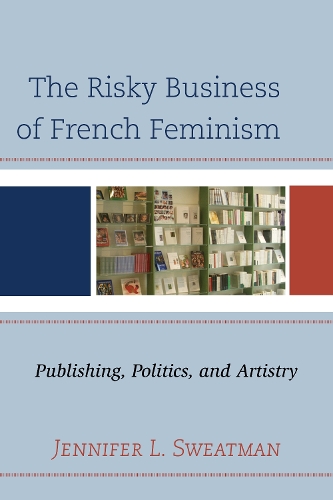
The Risky Business of French Feminism: Publishing, Politics, and Artistry
(Hardback)
Publishing Details
The Risky Business of French Feminism: Publishing, Politics, and Artistry
By (Author) Jennifer L. Sweatman
Bloomsbury Publishing PLC
Lexington Books
26th August 2014
United States
Classifications
Tertiary Education
Non Fiction
Publishing and book trade
Social and cultural history
305.420944
Physical Properties
Hardback
226
Width 161mm, Height 237mm, Spine 20mm
467g
Description
The Risky Business of French Feminism: Publishing, Politics, and Artistry examines the institutional history of the publishing house Editions des Femmes as well as its relationship to the French Womens Liberation Movement (MLF) from 1972 to the present. The founding and subsequent success of Editions des Femmes in the publishing milieu intensified the ideological divisions within the MLF and highlighted the extent to which that movement failed to adequately reflect on the power inherent in its recourse to print culture as an agent of change. In particular, Editions des Femmes produced several periodical publications and pioneered a woman-centered subculture that attached militant political meanings to the practice of buying and publishing books. While the MLF succeeded in changing legislation detrimental to women, it was not able to create unified cultural politics or construct a long-term media strategy that could preserve the movements original ideals and unity. Jennifer L. Sweatman explores the long-term dissipation of the MLF as a unified force not only as an outcome of ideological disagreement, but also due to conflicting views on culture, womens creativity as a strategy for empowerment, and the utility of media for creating change. As the MLF fragmented, unable to fully come to terms with its various consumer identities, its need for capital to support creative projects, and its difficult experience with collective decision-making, the Editions des Femmes project was seen as incredibly controversial. However, Editions des Femmes embodied a broader strategy for cultural transformation that privileged womens creative works rather than feminism, situating it as a successful forerunner of the revitalization of the publishing industry from below as small, independent houses challenged the large, media conglomerate control of the industry.
Reviews
The book is well written and organized. Furthermore, it is supported by thorough research in archives and private libraries, interviews, and literature about the houses activities. . . .The author excels at disentangling the love hate relationship between the militant Fouque and principal leaders of the Mouvement de Libration des Femmes (MLF). . . .This books greatest contribution is its historical analysis of dition des Femmes, and its role in material culture. It clearly demonstrates how it shaped womens coming into print in times of cultural and political changes as an artistic venue within which women writers and readers could find each other. * Contemporary French Civilization *
Sweatmans study is an especially intriguing enterprise because she analyzes an aspect of twentieth-century French feminist activism that has remained shrouded in controversy, scandal, and debates: Antoinette Fouques infamous initiative to copyright the acronym MLF (Mouvement de Liberation des Femmes, or Womens Liberation Movement) in 1979 to the dismay of most French feminist activists. The strength of Sweatmans study lies in the fact that it offers a measured account of a still controversial feminist group. By taking seriously the publishing houses aims and initiatives, it adds to our knowledge of the French second-wave feminist movement. Sweatmans focused study reminds us of the importance of revisiting the history of French second-wave feminism. * American Historical Review *
Despite French feminism's huge impact on Humanities disciplines in the English-speaking world, it has, until now, been represented as an exclusively psychoanalytic and linguistic project. Jennifer L. Sweatman's The Risky Business of French Feminism is the first book to explore the materialist basis of French feminist literary culture. Its widely researched, publishing-focused, and non-partisan analysis fundamentally changes what we thought we knew about French feminism. -- Simone Murray, Monash University
Author Bio
Jennifer L. Sweatman is assistant professor of history at Bridgewater College in Virginia.
